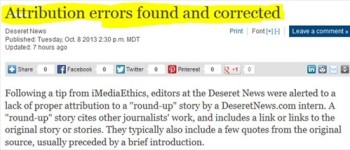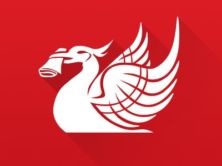
The Deseret News investigated intern Michael Smith's stories and found 40 cases of questionable attribution. (Credit: Deseret News, screenshot, yellow highlight added)
The Deseret News admitted yesterday that 40 stories by summer intern Michael Smith featured a “lack of proper attribution” after iMediaEthics flagged questionable attribution in one of Smith’s stories for the site.
iMediaEthics wrote yesterday in detail about the Deseret News’ investigation into Smith’s stories and admission that 40 stories contained problems. We also included detailed examples from two stories we found to have either lifted verbatim from another news outlet or didn’t properly attribute information. The Deseret News is a daily newspaper owned by the Church of Jesus Christ of Latter-day Saints and is listed by Mondo Times as having the 97th “highest circulation newspapers in the U.S. “
See that report, 40 Stories in Deseret News with improper attribution, Intern fail prompts investigation.
iMediaEthics has since heard back from the intern in question, Michael Smith, who lists himself as a current graduate student at Northwestern University’s Medill School of Journalism.
Smith apologized for the problems with his work and called this incident a learning experience. “This has turned out to be a very difficult and important lesson for me,” Smith e-mailed iMediaEthics.
“I only wish that my mistakes had been caught sooner. I fully intend to learn from this in my future work and to make sure I know exactly how to aggregate, which was my intention all along,” he wrote. He also apologized for the attribution issues. “I sincerely apologize that the work I did on these stories was construed as unethical or without sufficient attribution,” Smith wrote. “I did not intend to convey anything other than that the stories’ origins were from the original publications.”
Smith told iMediaEthics that as an intern his job was “doing what the Deseret News calls a ‘link-off’ or ’round-up’ which is by definition a summary of an already published story from elsewhere on the Web.”
He told iMediaEthics that he mentioned by name and linked to his original sources. “My intentions were not to pass this off as my own work, but to have the reader know that the information was obtained by another publication,” he wrote, adding that “It is my responsibility to make sure the reader knows that quotes and other information were from the original publication, and I failed in that regard.”
In the three stories iMediaEthics examined, Smith did indeed include the name and a link to the original sourcing. But, the problem was that he used content verbatim or just rewritten in the smallest ways without using quotation marks to indicate the original sources.
It’s not enough to just say the information came from another news outlet; if you’re using content verbatim you must quote. And, rewriting another news outlet‘s several-hundred word post paragraph by paragraph without trying to add anything new doesn’t make a new blogpost, aggregation norms typically state.
In one case, the first one that caught iMediaEthics’ eye, Smith only mentioned the original source — the Washington Examiner — once, and rewrote almost line for line the Examiner’s story. His aggregated version of the story was just 28 words shorter than the Examiner‘s story.
When iMediaEthics asked Smith about not using quotation marks and light rewrites, he responded:
“When I was given link-off or round-up assignments, I made sure to put in my story that the information was reported by whoever reported it. For instance, I would write, ‘According to…’ or ‘X reported that…’ The information that followed, I thought, was clear that it was not coming from me.
“Clearly I did not know the proper way to aggregate, which was my intention. I now know that I should have used quotation marks even after I wrote ‘According to…’ or ‘X reports that…’ I thought that explicitly stating whoever reported made it clear that it was from them, and not me, but I was obviously wrong. My intentions were that the reader would know that the information was from an outside source, but my lack of knowledge in aggregating prevented that.”
At least one reader responded to iMediaEthics’ yesterday story on the problems with Smith’s work asking about his training.
@SSmithWriter do you think this is a training issue? Newsrooms now go so fast, greenies don’t have the same luxury of guidance & mentors
— Valerie Bauman (@valeriereports) October 9, 2013
iMediaEthics sent follow-up questions to Smith asking for more details about the training he received at the Deseret News before being assigned with the aggregation stories, what his journalism background is, and if his internship was paid or unpaid. He simply responded that “I have done my best to explain the situation.”
We’ve also sent follow-up questions to DeseretNews.com’s general manager Chris Higbee asking for more details on his previous statement to iMediaEthics that the Deseret News has “implemented training and tighter controls to correct such problems” with attribution moving forward. We’ve also asked for more information concerning its internship program and whether interns typically write 76 stories in a summer, like Smith did. We’ll update with any responses.
Outside of the 40 posts by Smith that the Deseret News has now labeled improper attribution, The Deseret News admitted this summer that six stories by columnists Richard and Linda Eyre failed to properly attribute, as iMediaEthics wrote at the time. In that case, the Deseret News only found the questionable stories after one post, which lifted from the New York Times, was flagged, and the paper reviewed their work.
Concerning the first story, Eyre told iMediaEthics at the time that he “forgot” to put quotation marks around several paragraphs he copy and pasted from the Times.







Comments Terms and Conditions